Date et lieu du colloque : 15 et 16 janvier 2027, Université Versailles Saint-Quentin-en-Yvelines, Campus de Saint-Quentin-en-Yvelines, 47 boulevard Vauban, 78280 Guyancourt. Format hybride (zoom) possible.
Organisé par : Mathilde Bouilland (CELLF, Sorbonne Université), Lucile Martin (DYPAC, UVSQ), Samuel Poulain (ALITHILA, Université de Lille)
Argument :
Que devient le texte lorsque sa valeur n’est plus indexée à la durée, à la conservation ou à la canonisation, mais à des usages situés, éphémères ou de nature à le rendre périssable ? En proposant le néologisme de jetabilité sous l’Ancien Régime, ce colloque se propose d’analyser les conditions sociales, matérielles et symboliques selon lesquelles les écrits sont conservés, délaissés, défaussés ou réactivés, et d’examiner comment ces pratiques reconfigurent les notions de patrimoine, de canon et de mémoire littéraire. Ce colloque « Jeter les textes ? » propose d’actualiser la recherche en cours sur les régimes de conservation textuelle, en posant comme hypothèse centrale l’idée que la disparition n’est pas un accident, mais un élément structurant du système littéraire de l’Ancien Régime.
Axe 1 : Jetabilité et circulation, des pratiques textuelles aux pratiques littéraires
Ce premier axe interroge les circulations des pratiques textuelles dans l’Ancien Régime en prenant pour point d’entrée la jetabilité. Par ce terme, on entend non pas une absence de valeur, mais une valeur située, provisoire, un régime de possibilité inscrit dans des pratiques et des contraintes historiques, qui concerne à la fois les supports matériels et les textes eux-mêmes. Le suffixe invite à déplacer la réflexion du fait vers l’action : non pas ce qui est jeté, mais ce qui peut l’être, ce dont on estime possible ou acceptable de se défaire. La jetabilité ne renvoie donc pas uniquement à la destruction matérielle des supports, mais aussi à la mise hors d’usage des textes eux-mêmes, lorsque ceux-ci cessent d’être jugés actuels ou pertinents. Elle permet ainsi de distinguer plusieurs niveaux : un texte peut survivre tout en voyant disparaître la majorité de ses exemplaires ; inversement, des exemplaires peuvent être conservés alors que les textes qu’ils portent cessent d’être lus. Penser la jetabilité revient donc à articuler usages présents et formes de mémoire, sans présupposer la continuité ou la transparence de l’archive.
Nous souhaitons déplacer la focale, et partir non pas des textes conservés, ou consacrés par le canon, mais de ce qui a été jeté ou qu’on a laissé disparaître, qu’il s’agisse d’écrits définitivement perdus, jamais écrits ou, au contraire, retrouvés par hasard. L’enquête repose ainsi sur une définition volontairement inversée des patrimoines textuels, non pas à partir des textes que l’histoire littéraire a retenus, mais à partir de ceux dont elle s’est débarrassée, volontairement ou non. En ce sens, la jetabilité ne relève pas de l’exception, mais constitue une composante ordinaire du système littéraire, qui pourra donner lieu aux pistes (non exhaustives) de réflexion suivantes :
Quels types de circulations matérielles influencent la conservation ou la disparition des textes ?
Quels critères distinguent un patrimoine subi d’un patrimoine voulu ?
Comment les contraintes matérielles, économiques ou logistiques (pénurie de papier, marché du livre...) orientent-elles les décisions de jetabilité ?
Quels acteurs et institutions jouent un rôle dans cette conservation, et comment ?
Axe 2 : Jeu, jetabilité : le texte éphémère
Ce second axe se concentre sur les régimes de défausse, entendus non comme des accidents, mais comme des modalités positives de production et d’usage des textes. La défausse, héritée du domaine du jeu de cartes, mais que l’on propose d’appliquer à la production textuelle, désignera ici l’ensemble des pratiques par lesquelles certains écrits sont volontairement ou nécessairement laissés à disparaître. La défausse ne relève pas toujours de la destruction : elle peut prendre la forme de l’abandon, de la non-recopie, de la non-réédition, du refus d’archivage ou de la relégation dans des usages périphériques. Elle inclut :
l’usage unique ou ponctuel : textes créés pour un moment précis, qu’il s’agisse de discours, harangues, billets ou pièces de circonstance ;
les changements à grande échelle de paradigme linguistique (passage du latin au vernaculaire, standardisation et normalisation en particulier après Malherbe des écrits…) ;
les productions issues de jeux : œuvres conçues pour se divertir, qui ne visent pas la transmission ou la postérité ;
l’ultra-imitation et la mode : textes qui imitent ou suivent un modèle existant, rapidement remplacés par de nouvelle productions.
La défausse articule autour de la question du jeu la durée de vie d’un texte, sa circulation et son usage social. Cet axe invite enfin à réfléchir à la vitesse de péremption des textes : certains genres, formes et pratiques s’usent-ils plus vite que d’autres ? L’horizon de conservation des textes est-il en somme indexé sur leur nature ? Pour y répondre, on pourra passer notamment par les pistes de réflexion suivantes :
Quels textes étaient conçus pour un usage circonscrit ou ponctuel, et comment leur durée était-elle anticipée (on pense par exemple à la querelle des sonnets de 1677) ?
Comment les pratiques de jeux savants influencent-elles la jetabilité ?
La défausse peut-elle être une stratégie politique et religieuse (comme la mise à l’Index) ? sociale ? esthétique ?
Comment les modes déterminent-elles la durée de vie des genres et des formes littéraires (par exemple la mode des romans-mémoires) ?
Existe-t-il des pratiques de péremption anticipée, de textes délibérément destinés à ne pas survivre ?
Quels mécanismes relient l’imitation et la circulation à l’usure des textes ?
Comment penser et interpréter les publications de textes normalement très circonstanciés (« lettres, discours et harangues », par exemple), qui les extirpent de leur « moment » original ? Pourquoi tente-t-on de faire survivre ces textes, surtout lorsqu’ils sont présentés comme difficilement imitables, ou sortis du goût de l’époque (on pense par exemple à des auteurs tels que Guez de Balzac, qui continue d’être publié alors même que son style est très vite senti comme « daté » par ses contemporains) ?
Y a-t-il une différence de conservation entre les œuvres attribuées à un auteur, et les œuvres anonymes ou collectives (peut-être senties comme « n’appartenant à personne » et donc plus facilement jetables, ou éphémères car liées à l’acte collectif de sociabilité) ?
Modalités de soumission :
L’appel à communications est ouvert à tou.te.s les chercheur.euse.s en histoire et littérature, en France ou à l’étranger. Les communications se feront en français. Les candidatures comprendront une proposition de communication (2000 signes maximum espaces comprises), accompagnée d’une courte présentation de l’auteur.ice, l’université ou l’organisme de de rattachement (800 signes maximum espaces comprises), ainsi qu’une bibliographie succincte. Les candidatures sont à envoyer au format PDF au plus tard le 27 avril 2026 aux adresses suivantes : lucile.martin1@universite-paris-saclay.fr ; bouillandmathilde@gmail.com ; samuel.poulain@univ-lille.fr.
Premières pistes bibliographiques :
BAHIER-PORTE, Christelle, REGUIG, Delphine (dir.), Anciens et Modernes face aux pouvoirs. L’Église, le Roi, les Académies (1687-1750), Paris, Honoré Champion, 2022.
BEUGNOT, Bernard, « Pratiques de l’écriture au XVIIe siècle : du manuscrit à l’imprimé », dans Almuth Grésillon et Jean-Louis Lebrave (dir.), Écrire aux XVIIe et XVIIIe siècles, Paris, CNRS Éditions, 2000, p. 27-51.
BLAIR, Ann, Too Much to Know: Managing Scholarly Information before the Modern Age, New Haven, Yale University Press, 2010.
BURKE, Peter, A Social History of Knowledge: from Gutenberg to Diderot, Oxford [Cambridge], Blackwell [Polity], 2000.
CHARTIER, Roger, Inscrire et effacer. Culture écrite et littérature (XIe-XVIIIe siècle), Paris, Seuil, coll. « Hautes Études », 2005.
CHARTIER, Roger, L’ordre des livres. Lecteurs, auteurs, bibliothèques en Europe entre XIVe et XVIIIe siècle, Aix-en-Provence, Alinéa, 1992.
DARNTON, Robert, The Great Cat Massacre and other Episodes in French Cultural History, New York, Basic Books, 1984.
FARGE, Arlette, Le Goût de l'archive, Paris, Seuil, 1989.
GENETTE, Gérard, Palimpsestes. La littérature au second degré, Paris, Seuil, 1982.
JOHNS, Adrian, The Nature of the Book: Print and Knowledge in the Making, Chicago, Chicago University Press, 1998.
JOUHAUD, Christian, Les Pouvoirs de la Littérature. Histoire d’un paradoxe, Paris, Gallimard, coll. « NRF essais », 2000.
MAHRER, Rudolf, « La plume après le plomb », Genesis, n° 44, 2017, p. 17-38.
MARTIN, Henri-Jean, Livre, pouvoirs et société à Paris au XVIIe siècle (1598-1701), Genève, Droz, 2 vol., 1969.
MARTIN, Henri-Jean, Histoire et pouvoirs de l’écrit, Paris, Albin Michel, 1996.
MOUREAU, François, Les Presses grises. La contre-façon du livre XVIe-XIXe siècles, Paris, Klincksieck, 1990.
PEUREUX, Guillaume, De main en main. Poètes, poèmes et lecteurs au XVIIe siècle, Paris, Hermann, 2021.
VIALA, Alain, Naissance de l’écrivain, sociologie de la littérature à l’âge classique, Paris, Éditions de Minuit, 1985.
SCHUWEY, Christophe, « Éditer et vendre des poètes démodés à la fin du XVIIe siècle, l’exemple du recueil Barbin », Pratique & formes littéraires 16-18, n° 16, 2019, p. 77-97.
SCHUWEY, Christophe, Un entrepreneur des lettres au XVIIe siècle : Donneau de Visé, de Molière au Mercure Galant, Paris, Classiques Garnier, 2020.
Comité scientifique :
Karine Abiven (CÉRÉdI, Université de Rouen) ; Delphine Amstutz (CELLF, Sorbonne Université) ; Vincent Haegele (Conservateur des bibliothèques de Versailles) ; Adeline Lionetto (CELLF, Sorbonne Université) ; Laurence Macé (CÉRÉdI, Université de Rouen) ; Christine Noille (CELLF, Sorbonne Université) ; Catherine Rideau-Kikuchi (DYPAC, UVSQ) ; Christophe Schuwey (HCTI, Université de Bretagne Sud) ; Charles-Olivier Stiker-Métral (Université de Lille, ALITHILA).




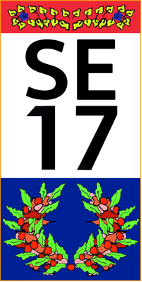
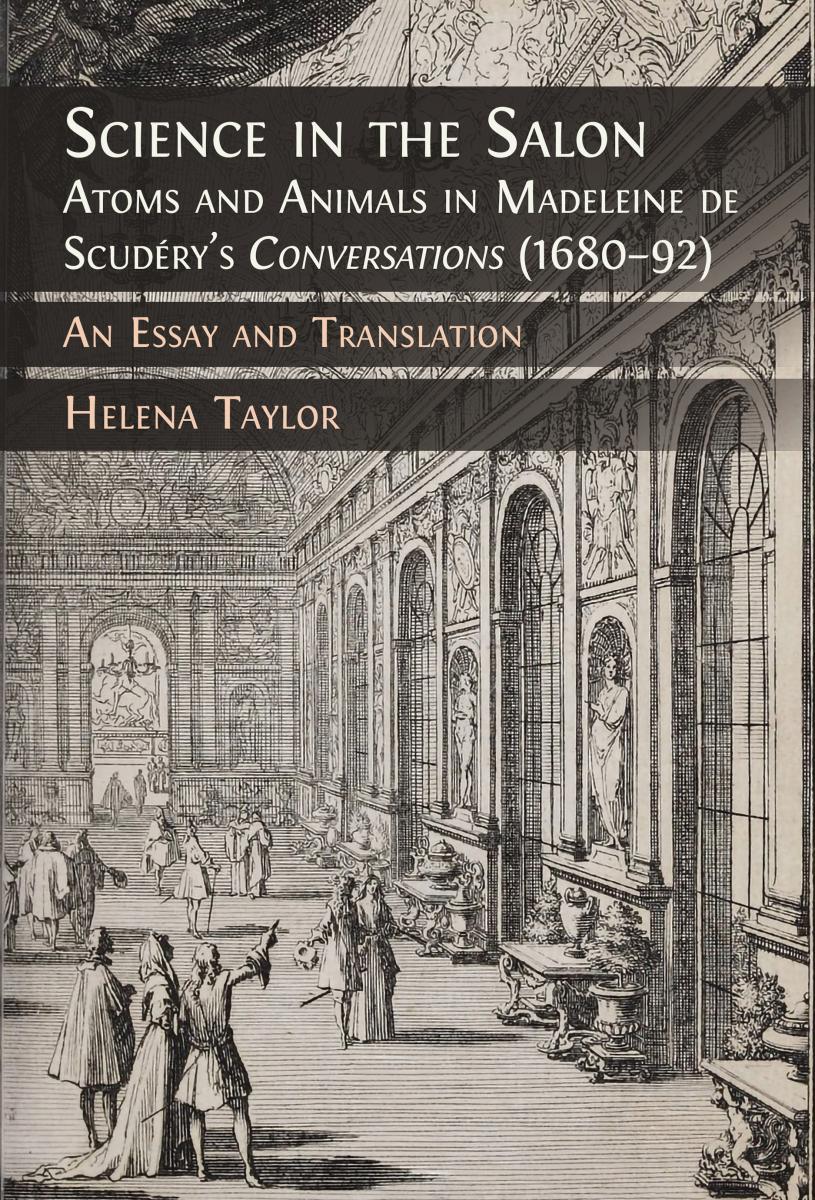 Helena Taylor, Science in the Salon: Atoms and Animals in Madeleine de Scudéry’s 'Conversations' (1680–92). An Essay and Translation, OpenBook Publisher, 2026.
Helena Taylor, Science in the Salon: Atoms and Animals in Madeleine de Scudéry’s 'Conversations' (1680–92). An Essay and Translation, OpenBook Publisher, 2026.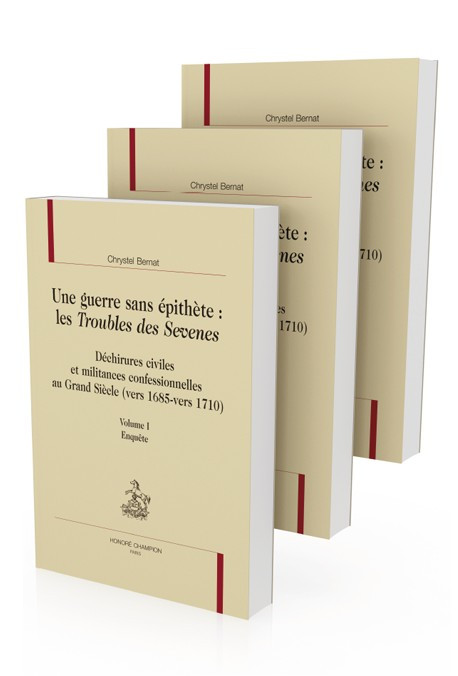 Chrystel Bernat, UNE GUERRE SANS ÉPITHÈTE : LES "TROUBLES DES SEVENES" Déchirures civiles et militances confessionnelles au Grand Siècle (vers 1685 - vers 1710), Paris, Honoré Champion, 2025.
Chrystel Bernat, UNE GUERRE SANS ÉPITHÈTE : LES "TROUBLES DES SEVENES" Déchirures civiles et militances confessionnelles au Grand Siècle (vers 1685 - vers 1710), Paris, Honoré Champion, 2025.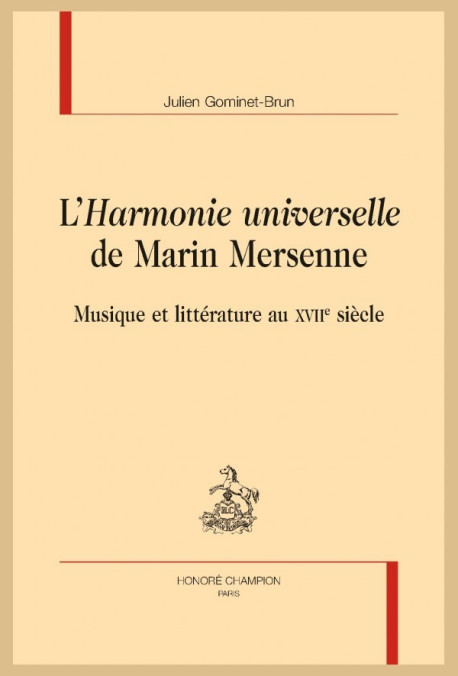 Julien Gominet-Brun, L'HARMONIE UNIVERSELLE DE MARIN MERSENNE. Musique et littérature au XVIIe siècle, Paris, Honoré Champion, 2026.
Julien Gominet-Brun, L'HARMONIE UNIVERSELLE DE MARIN MERSENNE. Musique et littérature au XVIIe siècle, Paris, Honoré Champion, 2026.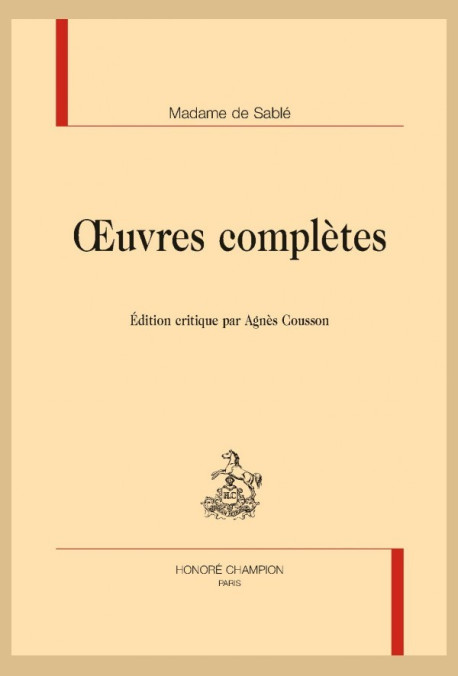 Madame de Sablé, Oeuvres complètes, édition critique par Agnès Cousson, Paris, Honoré Champion, 2026.
Madame de Sablé, Oeuvres complètes, édition critique par Agnès Cousson, Paris, Honoré Champion, 2026.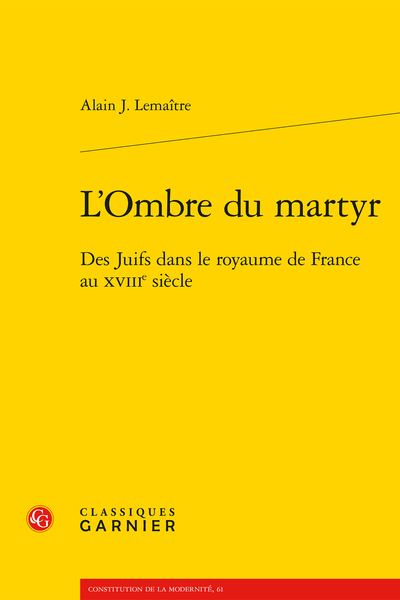 Gheerbrant (Antoine) et Laurenti (Jean-Noël), La Déclamation de la prose dans le théâtre de Molière. Recherche sur des pratiques oubliées, préface Bénédicte Louvat, Paris, Classiques Garnier, 2026.
Gheerbrant (Antoine) et Laurenti (Jean-Noël), La Déclamation de la prose dans le théâtre de Molière. Recherche sur des pratiques oubliées, préface Bénédicte Louvat, Paris, Classiques Garnier, 2026.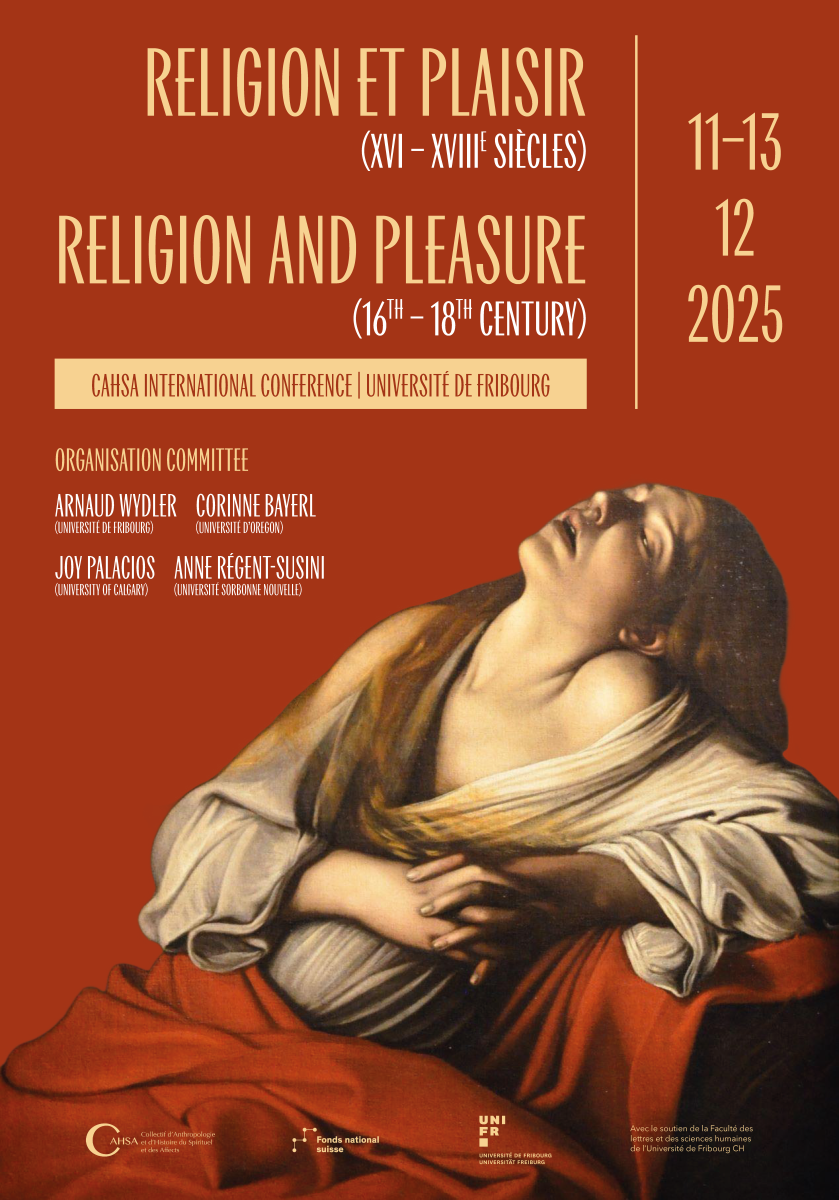 COLLOQUE CAHSA 2025
COLLOQUE CAHSA 2025